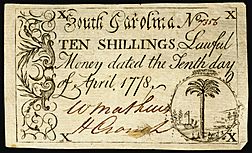South Carolina pound facts for kids
Quick facts for kids South Carolina pound |
|||
|---|---|---|---|
| South Carolina pound | |||
|
|||
| User(s) | South Carolina | ||
The pound was the official money used in South Carolina a long time ago, specifically until the year 1793. Back then, money worked differently than it does today. People used different types of pounds, shillings, and pence.
Contents
Early Money in South Carolina
When South Carolina was a British colony, people first used real British money. This was called sterling coin. But there wasn't always enough British money to go around.
Paper Money Appears
To help with trade, South Carolina started printing its own paper money in 1703. These paper notes were also called "pounds," "shillings," and "pence." However, they were not worth as much as the British sterling coins. For example, one South Carolina shilling was only worth about eight pence of British sterling money.
Proclamation and Lawful Money
The first paper money printed in South Carolina was known as "Proclamation Money." Later, in 1748, a new type of money was introduced. This was called "Lawful Money." One Lawful shilling was worth about 4 and ⅔ Proclamation shillings. This change happened to try and make the money system more stable.
Money During the Revolution
During the American Revolutionary War, South Carolina, like other states, needed a lot of money to pay for the war. The state started printing its own special money called Continental currency. This money was also measured in pounds, shillings, and pence. It was also linked to the Spanish dollar. For example, one Spanish dollar was worth 32 and a half shillings of this new money.
The Switch to U.S. Dollars
After the war, the Continental currency lost a lot of its value. This is called hyperinflation, which means money becomes almost worthless very quickly. Because of this, the Continental currency was replaced by the U.S. dollar. The exchange rate was very high: 1,000 Continental dollars were only worth 1 U.S. dollar. This change helped create a more stable money system for the new United States.
 | Charles R. Drew |
 | Benjamin Banneker |
 | Jane C. Wright |
 | Roger Arliner Young |


